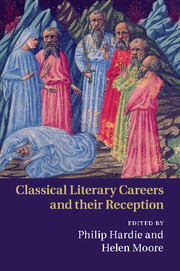Book contents
- Frontmatter
- Contents
- List of contributors
- Preface
- Note on the text
- Introduction: Literary careers – Classical models and their receptions
- 1 Some Virgilian unities
- 2 There and back again: Horace's poetic career
- 3 The Ovidian career model: Ovid, Gallus, Apuleius, Boccaccio
- 4 An elegist's career: from Cynthia to Cornelia
- 5 Persona and satiric career in Juvenal
- 6 The indistinct literary careers of Cicero and Pliny the Younger
- 7 Re-inventing Virgil's Wheel: the poet and his work from Dante to Petrarch
- 8 Did Shakespeare have a literary career?
- 9 New spins on old rotas: Virgil, Ovid, Milton
- 10 Bookburning and the poetic deathbed: the legacy of Virgil
- 11 Literary afterlives: metempsychosis from Ennius to Jorge Luis Borges
- 12 ‘Mirrored doubles’: Andrew Marvell, the remaking of poetry and the poet's career
- 13 Dryden and the complete career
- 14 Goethe's elegiac sabbatical
- 15 Wordsworth's career prospects: ‘peculiar language’ and public epigraphs
- Epilogue: Inventing a life – a personal view of literary careers
- List of works cited
- Index
1 - Some Virgilian unities
Published online by Cambridge University Press: 10 November 2010
- Frontmatter
- Contents
- List of contributors
- Preface
- Note on the text
- Introduction: Literary careers – Classical models and their receptions
- 1 Some Virgilian unities
- 2 There and back again: Horace's poetic career
- 3 The Ovidian career model: Ovid, Gallus, Apuleius, Boccaccio
- 4 An elegist's career: from Cynthia to Cornelia
- 5 Persona and satiric career in Juvenal
- 6 The indistinct literary careers of Cicero and Pliny the Younger
- 7 Re-inventing Virgil's Wheel: the poet and his work from Dante to Petrarch
- 8 Did Shakespeare have a literary career?
- 9 New spins on old rotas: Virgil, Ovid, Milton
- 10 Bookburning and the poetic deathbed: the legacy of Virgil
- 11 Literary afterlives: metempsychosis from Ennius to Jorge Luis Borges
- 12 ‘Mirrored doubles’: Andrew Marvell, the remaking of poetry and the poet's career
- 13 Dryden and the complete career
- 14 Goethe's elegiac sabbatical
- 15 Wordsworth's career prospects: ‘peculiar language’ and public epigraphs
- Epilogue: Inventing a life – a personal view of literary careers
- List of works cited
- Index
Summary
The standard demarcations of the Virgilian career are already present at, or soon after, the poet's death in 19 BC in his epitaph and in the famous lines that purport to introduce the Aeneid. The first may, or may not, be the work of Virgil:
Mantua me genuit, Calabri rapuere, tenet nunc
Parthenope. Cecini pascua, rura, duces.
Mantua begot me, the Calabrians snatched me away, Parthenope now possesses me. I sang of pastureland, the country, leaders.
The Eclogues, Georgics and Aeneid are denoted by the words pascua, rura and duces, pasture for animals, ploughlands and heroes, standing emblematically for pastoral, didactic and epic verse.
Servius tells us that the second passage was excised from its place as the opening hexameters of the Aeneid, but scholarly opinion largely regards it as Tiberian in date:
Ille ego qui quondam gracili modulatus auena
carmen et egressus siluis uicina coegi
ut quamuis auido parerent arua colono,
gratum opus agricolis, at nunc horrentia Martis …
I am he who once tuned my song on a slender reed, and, departing from the woodland, compelled the neighbouring fields to obey the husbandman, however grasping, a work welcome to farmers: but now [I sing] of the bristling [arms] of Mars.
Here carmen, in association with gracili auena and siluis, stands for Virgil's initial masterpiece. The Georgics is an opus that has uicina arua, worked by a colonus, and agricolae for its theme. We move into the Aeneid via the phrase horrentia Martis, anticipating arma to come.
- Type
- Chapter
- Information
- Classical Literary Careers and their Reception , pp. 17 - 38Publisher: Cambridge University PressPrint publication year: 2010
- 7
- Cited by

